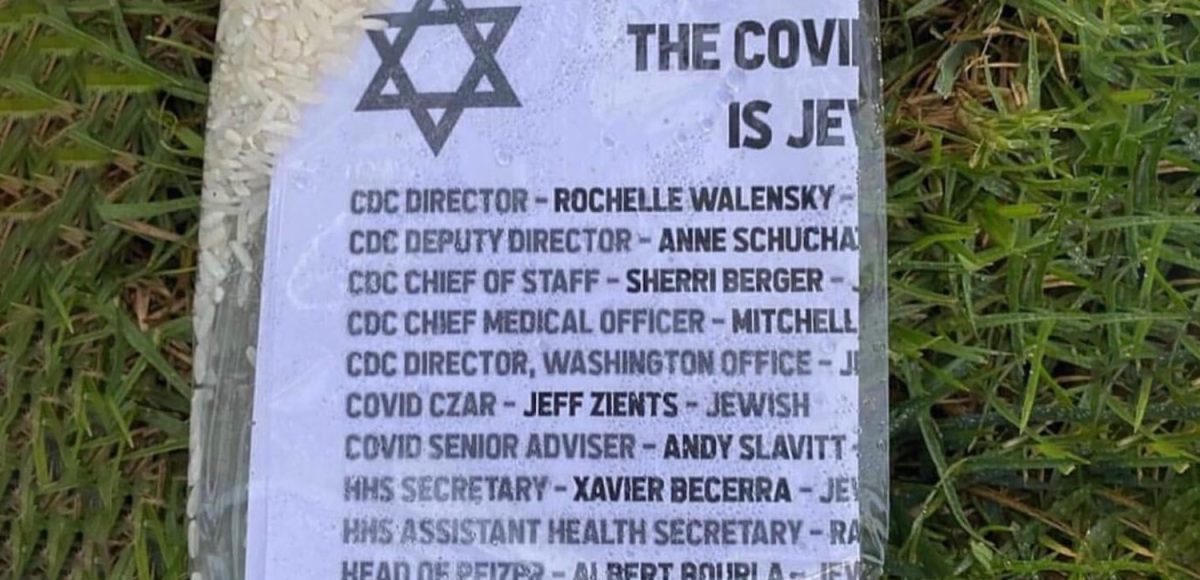After multiple incidents last month where flyers containing antisemitic tropes and COVID-19 conspiracies were distributed throughout the city, the Beverly Hills City Council explored possible legal and civil remedies at its Jan. 4 Regular Meeting. Flanked between a Star of David and a pentagram, the text at the top of the flyer reads: “Every single aspect of the COVID agenda is Jewish.” The flyers bared the logo of the Goyim Defense League, self-described as a “loose network of individuals connected by their virulent antisemitism.”
While the Beverly Hills Police Department (BHPD) continues to investigate and monitor the situation, no action, criminal or otherwise, has been taken. At the request of Vice Mayor Lili Bosse, City Attorney Larry Weiner and BHPD Chief Mark Stainbrook presented the Council with options for how the city can best respond.
“When we had these pamphlets that were placed in front of people’s sidewalks, that were placed on people’s private property, that referenced a website, that was clear hatred,” Bosse said. “I felt that I had to stand up, that we have to stand up., that we can’t be silent.” Bosse wants the city to work with organizations like the Anti-Defamation League (ADL), the American Civil Liberties Union (ACLU), the Holocaust Museum, and the FBI to fight the hate crimes. “This is not only happening in our city, it’s happening in other cities and other states,” she added. “And if we are silent, will happen again.”
Similar flyers with the same logo were found in Pasadena, as well as states across the country, including Texas, North Carolina, Idaho, Vermont, Alabama, Illinois and Florida. According to Chief Stainbrook, similar incidences seen nationally “spawn from the same groups are from the same website.”
While the police department is working with the City Attorney’s office to help define hate crimes and hate speech, Stainbrook said that the District Attorney’s Hate Crimes Unit indicated charges would be hard to bring “based on what was distributed, in terms of the literature.” According to Stainbrook, while criminal trespassing charges can be brought if a perpetrator was identified, it’s unlikely to lead to a prosecution and only a citation.
“The officers are on alert for somebody coming back into the city, and if we can interdict someone, we will certainly try to do that,” Stainbrook added.
As police continue investigating potential criminal remedies, legal action is limited, with freedom of all speech protected by the First Amendment. “It’s a speech activity, so there aren’t a ton of effective legal remedies,”Weiner said. “But one of them, potentially, is civil trespass.”
To establish a civil trespass claim, there are five elements: the plaintiff must have ownership of the property, the defendant must have entered onto the property, trespassed without consent, causation and harm. Regarding entry onto the property, Weiner noted the legal gray areas. Since physical human entry didn’t occur, the flyers thrown in a bag with rice alone may constitute as trespassing, according to Weiner.
“Harm is the other thing that’s a little bit unusual here,” Weiner added, since its definition can extend beyond physical harm. “So essentially, one could sue for, if you will, emotional distress caused by someone who engages in civil trespass.”
In the case of trespass, the City Attorney can’t bring the action himself because he must have ownership of the property in question. At the City Council’s direction, Weiner will work with residents seeking to bring a civil trespass action lawsuit to find pro bono legal representation. He will also return to the council with revisions to laws pertaining to the distribution of commercial materials to cover hate speech. For those looking to take other actions, Weiner suggested various education initiatives, making donations to organizations that fight antisemitism and protect individual rights, and more.
“We should try and find out who these people are,” Councilmember John Mirisch said. “We should try and expose them. We should try and embarrass them.”
“We have three detectives specifically assigned to intelligence to monitor social media, to monitor hate crimes or hate speech, monitor groups and individuals that could engage in that kind of activity, and will go after them full force if they’re committing a crime,” Stainbrook said.
The department also works with various houses of worship in the city, providing their security staff with aid and resources to their security staff. “Obviously, the city is iconic,” Stainbrook said. “And we’ve had a previous history here of people coming here to commit hate crimes. So, we are on it, 100 percent, all the time.” However, the Chief underscored that they must “balance the rights of heinous individuals to say things that we find disgusting and distasteful,” Stainbrook said.
The Council has a long history of expressing solidarity with Israel and against antisemitism. In August of 2020, the City Council passed a resolution condemning antisemitism in response to anti-Zionist incidents that happened at universities in Los Angeles. The resolution, which also cites an incident at UCLA in May of 2019 where a guest lecturer spoke out against Israel, is one of many similar actions taken.
“We have passed numerous resolutions condemning antisemitism,” Mayor Robert Wunderlich said. “It’s a reflection of how antisemitism is on the rise in the last few years, how many times we’ve had to condemn it. And condemning it is useful. Words matter. Condemning it, though, also doesn’t feel like enough.”







